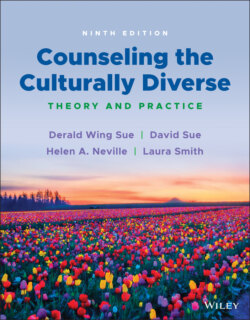Читать книгу Counseling the Culturally Diverse - Laura Smith L. - Страница 56
INDIVIDUAL AND UNIVERSAL BIASES IN PSYCHOLOGY AND MENTAL HEALTH
ОглавлениеPsychology—and mental health professionals in particular—has generally focused on either the individual or the universal levels of identity, placing less importance on the group level. There are several reasons for this orientation. First, our society arose from the concept of rugged individualism, and we have traditionally valued autonomy, independence, and uniqueness. Our culture assumes that individuals are the basic building blocks of our society. Sayings such as “Be your own person (à la Dr. D.),” “Stand on your own two feet,” and “Don't depend on anyone but yourself” reflect this value. Psychology and education represent the carriers of this value, and the study of individual differences is most exemplified in the individual intelligence testing movement that pays homage to individual uniqueness (Suzuki et al., 2005).
Second, the universal level is consistent with the tradition of psychology, which has historically sought universal facts, principles, and laws in explaining human behavior. Although this is an important quest, the nature of scientific inquiry has often meant studying phenomena independently of the context in which human behavior originates. Thus, therapeutic interventions from which research findings are derived may lack external validity (Chang & Sue, 2005).
Third, we have historically neglected the study of identity at the group level for sociopolitical and normative reasons. As we have seen, issues of race, gender, sexual orientation, and disability seem to touch hot buttons in all of us because they bring to light issues of oppression and the unpleasantness of personal biases. In addition, racial and ethnic differences have frequently been interpreted from a deficit perspective and have been equated with being abnormal or pathological (Guthrie, 1997; Parham et al., 2011). We have more to say about this in Chapter 6.
Disciplines that hope to understand the human condition cannot neglect any level of our identity. For example, psychological explanations that acknowledge the importance of group influences such as gender, race, ethnicity, sexual orientation, socioeconomic class, and religious affiliation lead to a more accurate understanding of human psychology. Failure to acknowledge these influences may skew research findings and lead to biased conclusions about human behavior that are culture‐bound, class‐bound, and gender‐bound (Buchanan, Perez et al., 2020).
Thus, it is possible to conclude that all people possess individual, group, and universal levels of identity. A holistic approach to understanding personal identity demands that we recognize all three levels: individual (uniqueness), group (shared cultural values, beliefs, and experiences), and universal (common features of being human). Because of the historical scientific neglect of the group level of identity, this text focuses primarily on this category.
Although the concentric circles in Figure 2.1 might unintentionally suggest a clear boundary, each level of identity must be viewed as permeable and ever‐changing in salience. In counseling and psychotherapy, for example, a client might view his or her uniqueness as important at one point in the session and stress commonalities of the human condition at another. Even within the group level of identity, multiple forces may be operative. As mentioned earlier, the group level of identity reveals many reference groups, both fixed and nonfixed, that might impact our lives. Being an elderly gay male Latino, for example, represents four potential reference groups operating on the person; the cultural groups also includes membership in multiple social identities, such as American Indian queer woman and White heterosexual man. The culturally responsive helping professional must be willing and able to balance understanding the three levels of personality without negating any aspect of their identity, particularly at the group level.
